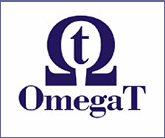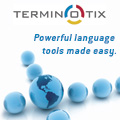Home » Compare Comparing OmegaT and LogiTerm Pro Which software is better? Here is a rundown of features and reviews to help you make your decision. | |  |  | | Name | OmegaT | LogiTerm Pro | | Review breakdown | | | | Most helpful review | Simple, robust, efficient I use this program for most of my translation. It’s a free program [1]. Very simple to learn (the start screen shows a 5-minute start guide, and it takes really 5 minutes to start off). Has an excellent spell check feature, as well as grammar check via a plugin [2]. Extremely robust: haven’t experienced any crash or hang for years. You can have it as a portable version on a USB stick. User settings as well as projects can be easily transfered to another computer making system/computer updates or replacements seamless and painless. The functionality can be expanded with scripts [3]. The user groups [4] are ready to answer questions.
[1] OmegaT in Free Software Directory
[2] Implementation of LanguageTool
[3] Lots of scripts come with OmegaT distribution, but can also be downloaded from the relevant SourceForge page. Scripts (as well as other interesting issues) are discussed in Kos Ivantsov’s blog
[4] at groups.io and at sourceforge.net34 out of 34 found this review helpful.
Read more reviews → | Very powerful, flexible and user-friendly Logiterm is not a translation memory software in the strict sense insofar as it doesn’t memorize segments as you translate them. However, it is a very powerful and intuitive tool for leveraging past translations, documentation, glossaries, etc.
PROS
- The most accurate alignment engine out there.
- The most flexible and effective tool for accessing past translations that I have tried. You can add the most relevant and/or reliable previous translations and glossaries to the TM you use to pretranslate a doc but still access your entire corpus of past translations, related documents and glossaries in another window when editing and confirming the translation. You can search your entire corpus or specific parts of it, search full text or translation pairs, use search parameters, etc.
- Very easy to learn and easy to work with, especially when translating in Word. For Word, Logiterm installs a toolbar instead of forcing you to work in another environment. Past translation pairs with highlighted differences appear in a pop-up window for editing and are then entered directly in the Word document. I find it a much more natural and flexible way to translate than working in a TEnT. You can use the Logiterm pop-up window where you want, switch back to translating directly in Word where it makes more sense, continue accessing Logiterm’s search functions whenever you want. There are no formatting glitches caused by exporting the finished translation from the TEnT back to Word (except that inline codes must be added manually in Word). At the same time, Logiterm doesn’t have the severe limitations of the Wordfast Word add-on.
- The almost-free Logiterm toolbar makes it easy to share output with collaborators who don’t own Logiterm and lets them use and edit pretranslation results as effectively as owners of the software.
- Tech support is fast and helpful.
CONS
- Not nearly as good as MemoQ or other conventional TMs for translating a document with many internal repetitions but no similarity to past translations. Logiterm will identify 100% matches within a document and propagate your translation throughout the file but it can’t find internal fuzzy matches within a document.
- No QA function. If you want QA, you have to use a separate error-checking software. I use Verifika and in a way I don’t mind, since I find Verifika is much better than the built-in error checkers in other CAT tools anyway, but it is definitely a more cumbersome process.
- Terminotix is very slow to fix bugs. For example, Logiterm doesn’t process end-of-segment punctuation, just leaves it as is. So if a segment ends with a space followed by a colon or semi-colon, there is no way to remove the space in Logiterm. If a segment ends with a bracket, Logiterm leaves it there, even if you have moved the parentheses to inside the segment. You have to edit out unwanted end-of-segment punctuation in Word. This is not a huge problem since you have the Word screen in front of you as you translate in the Logiterm pop-up window, but Terminotix has known about this bug for years and definitely should have addressed it by now.
BOTTOM LINE
I have been using Logiterm as my main CAT tool for about 10 years and, despite some irritants, I still find it to be the smoothest CAT software to work with. After trying others periodically, I keep coming back to Logiterm because of its flexibility and ease of use.
UPDATE
Since I wrote this review, a new Logiterm release has fixed the bugs and added the ability to find and process fuzzy matches within a document.
So, at this point, the only situation in which I would still prefer memoQ to Logiterm is a large project with many internal repetitions that has to be divided among several translators. Logiterm has nothing comparable to the capabilities of memoQ's server edition. But for any one-man job, I think Logiterm is the cleaner solution now. 7 out of 7 found this review helpful.
Read more reviews → | | Product description | OmegaT is a free and open source multiplatform computer Assisted Translation tool with fuzzy matching, translation memory, keyword search, glossaries, and translation leveraging into updated projects. Downloaded close to 900,000 times since its first release, OmegaT is developed by and for translators and offers everything you expect from a standard CAT tool.
Features
• Fuzzy matching
• Automatic propagation of translations
• Unlimited number of translation memories (TMX format)
• Unlimited number of glossaries (CSV and TBX format)
• Looking up terms in the project, in reference translation memories, in glossaries and in reference documents
• Projects with an unlimited number of folders and files, in all accepted formats
• Team projects with an unlimited number of translators
• Right to left and bidirectional writing management
• Tag protection and validation
• Morphological recognition
• Spell checking (Hunspell)
• Linguistic checking (LanguageTool)
• Dictionaries (mono and multilingual) in StarDict and Lingvo DSL formats
• Machine translation (Google Translate, Microsoft Translator, Apertium, Yandex, MyMemory)
• Public API for plugins: Additional file formats (Okapi), Local machine translation (Apertium)
• Running scripts written in Groovy and JavaScript
• Auto-completion from glossary entries, abbreviation list, history completion and history prediction
• Graphic aligner for all supported formats
• External search on the Internet
| A COMPLETE TRANSLATION SOFTWARE COMBINING A FULL-TEXT SEARCH ENGINE WITH TRANSLATION, TERMINOLOGY, DATA CONVERSION AND ALIGNMENT TOOLS | | Price | Free of charge & total freedom of use (no license number, no registration) | $795 | | File formats | More than 50 file formats, including Microsoft Word, Excel and PowerPoint, LibreOffice, HTML, TTX and SDLXLIFF (Trados), TXML (Wordfast Pro), IDML (InDesign) and PDF (text and Iceni Infix export) | No data | | License type | Perpetual, open source | Perpetual | | Operating system | MacOS, Windows, Linux | Windows XP, Windows Vista, Windows 7 | | System requirements | No specific requirements. Runs anywhere. | 1-GHz processor; 512 MB of RAM; 200 MB of available disk space | | Compatibility | Supports standard data exchange formats (TMX, TBX) and most standard source formats (see above) | No data | | Support and upgrades offered/included | Free community support, Free upgrades to all future versions | 1 year of free support and upgrades | | Support and tutorial links | https://groups.yahoo.com/neo/groups/OmegaT/info https://omegat.org/documentation#tutorials | No data | | Free trial | Perpetual license free of charge | No data | | Languages supported | No limitation whatsoever regarding useable language pairs. Possibility to use language codes that are not listed in the defaults. | No data | Looking to buy one of these tools? Save when you buy through ProZ.com Translator Group Buying Translator Group Buying → | | | | X Sign in to your ProZ.com account... | | | | | | |





